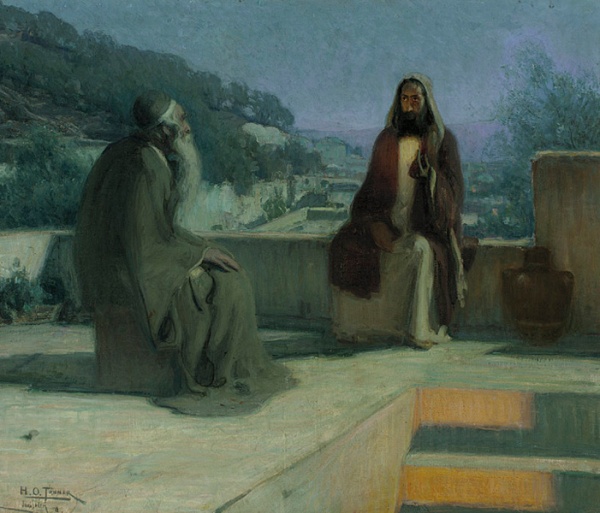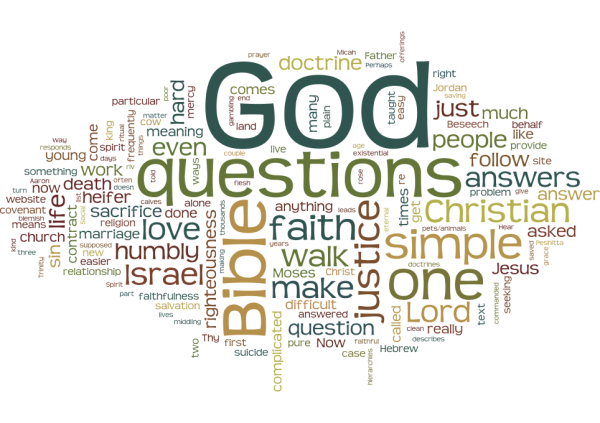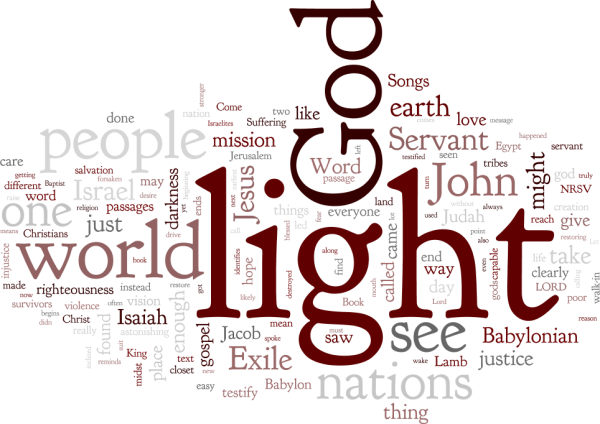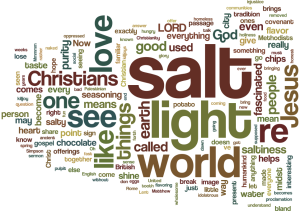The Wilderness of Fear
Rev. Mark Schaefer
March 8, 2020—Lent II
Part 2 of the series, “A Journey Through the Wilderness”
Genesis 12:1–4a; John 3:1–17
I. BEGINNING
If I were World Emperor, the first thing I would do would be to ban comment sections on the internet. I’d ban them because they’re completely corrosive to our civil order and because just reading through them can rob you of any faith you ever had in the human race.
But in addition, there is something cowardly about anonymous comment sections. It encourages all manner of hateful and deplorable speech by people who know they can remain safely hidden and free of consequence. If people believe something, they should have the courage of their convictions to attach their name to it. But people are afraid to attach their names to opinions they know are loathsome to others.
But people are often afraid to attach their names to opinions that are merely unpopular. There are folks who are reluctant to stand out from the crowd, to draw attention to themselves as opposing popular consensus. There’s a fear of ostracism that can take hold of us even if we’re not white supremacists spouting off our discredited racial theories online.
II. THE TEXT
There’s something of that fear going on in this morning’s Gospel lesson, though it’s often missed.

Jesus and Nicodemus, Henry Ossawa Tanner, African American Painter, 1899
In the lesson from John’s gospel we have Jesus being visited by a man named Nicodemus who starts off by saying, “Rabbi, we know that you are a teacher who has come from God; for no one can do these signs that you do apart from the presence of God.”
That’s pretty good. That’s a fairly strong assertion and a bold claim.
Jesus responds, “Very truly, I tell you, no one can see the kingdom of God without being born from above.” After which Nicodemus responds, “How can anyone be born after having grown old? Can one enter a second time into the mother’s womb and be born?”
From here begins a conversation on being born of water and spirit. And Jesus goes on to deliver a discourse on the importance of spiritual birth and on other matters esoteric, concluding with a statement that God loved the world so much that he gave his only begotten son—words that most of us know well.
But my purpose today is not to focus on the conversation so much as the context of the conversation. See, we are told at the outset that Nicodemus “came to Jesus by night.” This suggests that Nicodemus was a follower of Jesus but afraid to be found out as one. He was what is called a “crypto-Christian”—a hidden, secret Christian.
Read more...
The Wilderness of Want
March 1, 2020—Lent I
I. BEGINNING
We’re only four days into Lent and how many of us are already craving the things we gave up?

Image courtesy Wordle
That’s the challenge of Lent, of course. The deprivation, the self-denial. Giving up something for Lent that you don’t actually like or desire is not really getting the point of the whole exercise. Every year, someone will invariably make a joke about giving up something that is easy or that is not otherwise desirable. A former pastor of mine used to joke that he’d given up okra for Lent, not having found that particular vegetable appealing in the first place.
But the discipline of abstaining and fasting are meant to remind us of our deprivation. They are meant to remind us that we lack something. All of Lent is meant to refocus and re-center us. Abstaining from certain foods or fasting is meant to remind us of those who lack even the basic necessities and further to remind us of our dependence on God for what we have. At the heart of our Lenten disciplines is a deprivation designed to remind us of a deeper spiritual truth about ourselves. To that end, fasting and self-denial have been central parts of spirituality for a long time.
Read more...
A World in Ashes
Rev. Mark Schaefer
February 26, 2020—Ash Wednesday
Joel 2:1–2, 12–17
I. BEGINNING

Ashes by Titus Thscarntke. Public domain.
It is a curious thing to start an entire season of the church year in ashes; ashes are usually the end of something, rather than the beginning. And yet, here we are at the beginning of the season of Lent, the first season of the Great Cycle of Easter, a period in the church year that will take us all the way until Christ the King Sunday in November. The bulk of the church year is found in this cycle that begins here, today, in ash.
The other great cycle—the Christmas cycle—begins with an oracle from Jeremiah that reads:
“The days are surely coming, says the LORD, when I will fulfill the promise I made to the house of Israel and the house of Judah.In those days and at that time I will cause a righteous Branch to spring up for David; and he shall execute justice and righteousness in the land.In those days Judah will be saved and Jerusalem will live in safety. And this is the name by which it will be called: “The LORD is our righteousness.” (Jeremiah 33:14–16)
Contrast that passage with the passage from the Prophet Joel:
Let all the inhabitants of the land tremble, for the day of the Lord is coming, it is near— a day of darkness and gloom, a day of clouds and thick darkness! Like blackness spread upon the mountains a great and powerful army comes; their like has never been from of old, nor will be again after them in ages to come.
One begins with the fulfillment of a “gracious promise” and a proclamation of salvation. The other, begins with the land trembling, darkness, and an army’s destruction.
Just a slight difference in tone there.
Read more...
What Happens on the Mountaintop…
Rev. Mark Schaefer
Cheltenham United Methodist Church
Sunday, February 23, 2020—Transfiguration Sunday
Exodus 24:12–18; Matthew 17:1–9
I. BEGINNING
Back in the 1960’s, the Catholic Church decided that its priests were not preaching from the Bible in any sufficiently broad way. That is, priests would pick their favorite passages and preach on those, neglecting the bulk of the Bible. And so, as part of the reforms of the Second Vatican Council, or Vatican II, they published something called the Ordo Lectionum Missae to create a schedule of readings that would be used throughout the churches that would guarantee that a wide selection of Biblical texts would get preached on.
The Protestant churches liked the idea so much that we stole it outright, tweaking it a little bit to avoid some of the deuterocanonical books like Tobit that we don’t have in our Bibles and eventually revised and standardized the various denominational lists to arrive at what we now know as the Revised Common Lectionary—one of the few great accomplishments in Christian unity.
Now, to be fair, the aim of the lectionary is to ensure broad coverage of the Biblical text so it’s not always the case that the four readings have anything to do with each other. This is especially the case when we’re in the middle of “ordinary time”—away from major holidays or seasons. Sometimes during those times the readings are worlds apart.
But not today. Today, on Transfiguration Sunday, the Old Testament lesson from Exodus and the Gospel lesson from Matthew have everything to do with each other.
Read more...
A Higher Standard
Rev. Mark Schaefer
Cheltenham United Methodist Church
February 16, 2020
Deuteronomy 30:15–20; Matthew 5:21–37
I. BEGINNING
In one well-known sketch from Monty Python’s Flying Circus, a man walks into an office to schedule an argument. After deciding to purchase just the one five-minute argument rather than the package deal of ten, and after mistakenly walking into the room for verbal abuse, he walks into a room where a man is seated behind a desk:
Man (Michael Palin): Is this the right room for an argument?
Other Man:(John Cleese) I’ve told you once.
Man: No you haven’t!
Other Man: Yes I have.
M: When?
O: Just now.
M: No you didn’t!
O: Yes I did!
M: You didn’t!
O: I did!
M: You didn’t!
Once the man behind the desk asks him if he’s here for the five-minute argument or the full half-hour, he realizes he’s in the right place and they continue:
O: Anyway, I did.
M: You most certainly did not!
O: Now let’s get one thing quite clear: I most definitely told you!
M: Oh no you didn’t!
O: Oh yes I did!
M: Oh no you didn’t!
O: Oh yes I did!
This continues on for a while before the man finally says,
M: Oh look, this isn’t an argument!
O: Yes it is!
M: No it isn’t. It’s just contradiction!
O: No it isn’t!
M: It IS!
O: It is NOT!
M: You just contradicted me!
O: No I didn’t!
And on it goes. They “argue” in this way over whether an argument is about more than contradicting one another, whether the five minutes are up, whether the man has paid for an additional five minutes, and so on.
And as bizarre as the sketch is, there is a kernel of truth to it: people often imagine an argument is taking place when it is not.
Read more...
Salt and Light
Rev. Mark Schaefer
February 9, 2020
Isaiah 58:1–12; Matthew 5:13–20
I. BEGINNING
I’m fascinated by Palestinian Christians. I’m fascinated because some of the Palestinian Christian communities in Palestine and Israel can trace their heritage all the way back to the earliest days of Christianity. Some even use liturgies in Aramaic, the language of Jesus.
I’m fascinated by the examples of these communities that are found in the places of origin of their tradition, even as the center of gravity of that tradition has shifted elsewhere: to Antioch, to Rome, to Constantinople, to Moscow, to Wittenberg, London, and so on.
I’m similarly fascinated by British Methodists. Methodism exploded along the American frontier and grew to enormous proportions along with the country. It was far more successful in the United States than it had ever been in the United Kingdom. And yet, it was there that Methodism got its start. And so I’m a little fascinated by British Methodists.
I had occasion to sit down and talk with a British Methodist colleague some years ago. He was the head of Methodist campus ministry in the UK and was attending a UM campus ministry conference here in the US. He was a lot of fun to talk to and at one point I asked him a question I’d been wondering: what is the reputation of Methodists in the UK? That is, what do they think of us in the country where it all got started?
“Oh,” he replied. “Mostly we’re seen as being against things.”
I knew what that meant.
It’s not a new complaint. The Roman historian Tacitus describes the Christians as having a “hatred of humankind”—because of their reluctance to get involved with anything that they thought of as idolatrous. And in ancient Rome, all the fun stuff was idolatrous in one way or another. And so, to Tacitus’ mind, the Christians had a “hatred of humankind.” They were “against things.”
Read more...
Keeping It Simple
Rev. Mark Schaefer
Cheltenham United Methodist Church
February 2, 2020
Micah 6:1–8; Matthew 5:1–12
I. BEGINNING
People often look to religion for answers. And so, it should come as no surprise that if you’re one of those people looking for answers, the free market dictates that someone out there will attempt to provide them for you.
Indeed, if you type the words “Bible answers” into Google, the first result that comes up is a website called Bible Questions Answered. The site boasts that it has answered 446,916 questions at the time of this writing. The top 20 most frequently asked questions on the site are:
- Women pastors/preachers? What does the Bible say about women in ministry?
- What does the Bible say about homosexuality? Is it a sin?
- What does the Bible say about tattoos/body piercings?
- Once saved always saved? / Is eternal security biblical? / Can a Christian lose salvation?
- Masturbation—is it a sin according to the Bible?
- What does the Bible say about interracial marriage?
- Who was Cain’s wife?
- What is the Christian view of suicide? What does the Bible say about suicide? What about a believer who commits suicide?
- Do pets/animals go to Heaven? Do pets/animals have souls?
- What happens after death?
- What does the Bible say about Christian tithing? Should a Christian tithe?
- What is the gift of speaking in tongues? Is it for today? What about praying in tongues?
- What does the Bible say about dinosaurs? Are there dinosaurs in the Bible?
- What is the importance of Christian baptism?
- What does the Bible say about drinking alcohol? Is it a sin for a Christian to drink alcohol?
- What does the Bible say about gambling? Is gambling a sin?
- What does the Bible teach about the Trinity?
- What does the Bible say about sex before marriage?
- Where was Jesus for the three days between His death and resurrection?
- What does the Bible say about divorce and remarriage?

Image courtesy Wordle
What fascinates me is that not a single one of the 20 most frequently asked questions has anything to do with meaning. All of these questions have to do with doctrine—what does Christianity teach? What are the rules? What am I supposed to do? There is not one question that asks, “What is the meaning of life?” or even “How do we reconcile God’s omnipotence with the presence of evil in the world?”
Perhaps it was just a function of the ranking of the questions and the deeper, more existential questions would be revealed by looking further into the site. But not even that yielded any questions on meaning. Rather, the questions being asked were more of the same, and frequently about topics even more arcane and particular: What does the Bible say about voyeurism? What is Binitarianism? What does the Holy Spirit do? What does the Bible say about false accusations? How big is heaven? Who was Zacchaeus in the Bible? Why does it matter that Jesus rose from the dead? If God hates abortion, why does He allow miscarriages? Why do men have nipples? What is a levirate marriage? What is listening prayer? What is a cowboy church? Should a Christian pay into Social Security and/or accept Social Security payments? What is the Peshitta?
Again, the most striking thing about these questions is how few of these questions—if any—are related to meaning and purpose. The one that comes closest is “Why does it matter that Jesus rose from the dead?,” which is at least a question of eschatology, that part of theology concerned with the end times and the ultimate purposes of God. But that question is outnumbered by questions like “Why do men have nipples?” and “What is a séance?” So many of these questions seek to have answers to so many particulars, to make sure to get all the details right. And the website is certainly prepared to give the right answer to answer your question definitively.
Read more...
Straightaway to Work
Rev. Mark Schaefer
January 26, 2020
Isaiah 9:1–4; Matthew 4:12–23
I. BEGINNING
There is a scene in the movie The Princess Bride where sword master Inigo Montoya at last confronts the evil Count Rugen, who had murdered Inigo’s father. He says, “Hello. My name is Inigo Montoya. You killed my father. Prepare to die.” In response, Rugen raises his sword … and then after a beat suddenly turns and runs away. It’s a hilarious moment because it all happens so quickly. After all the dramatic buildup the whole movie, with Inigo constantly describing how he will take vengeance on his father’s killer, after the dramatic confrontation—“Hello. My name is Inigo Montoya. You killed my father. Prepare to die”—Rugen just runs away. And fast! It makes for an excellent comic moment.
Indeed, sudden things are a staple of comedy, with immediacy and surprise an element of much physical comedy and, indeed, timing is an element of all good comedy. Comedy is not the only genre that benefits from suddenness and surprise, of course. Thrillers and horror movies make a lot of use of the “jump scare”—the sudden fright that comes out of nowhere.
Read more...
Light to the Nations
Rev. Mark Schaefer
January 19, 2020
Isaiah 49:1–7; John 1:29–42
I. BEGINNING
I used to have an apartment with a walk-in closet. Well, it was more of a walk-through closet on the way to the bathroom, but it was reasonably spacious and a convenient place to get dressed in the morning.
One such morning, I noticed that the light bulb was out in the closet. No matter—there was enough light coming in from the adjacent rooms to be able to dress myself appropriately. Or so I thought until I got halfway down my block toward work and realized that I was wearing a green suit jacket with blue suit pants. They had appeared identical in the low light of the walk-in but starkly different in the bright light of day. It’s amazing how different the world can look when you don’t have enough light to see.

Image courtesy Wordle
That’s one reason why driving at dusk is so dangerous, without sufficient light from the sun and with not enough contrast generated by your headlights, the landscape fades into a kind of sameness that makes it difficult to discern hazards.
Some religious traditions even make use of this phenomenon to demarcate when a day has truly ended. In some versions of Islam, the daily fast during Ramadan happens when you can no longer tell the difference between the leaves and the trees—a sign that the light of day is truly gone and night has set in.
Read more...
Fulfilling All Righteousness
Rev. Mark Schaefer
January 12, 2020
Isaiah 42:1–9; Matthew 3:13–17
I. BEGINNING
One of my college roommates, and best friends to this day, is an Iranian Jew, who emigrated with his family sometime in the mid-late 70’s at the age of ten.
One year, he had some business in town and he came down to visit the night before. It was Easter Sunday and there wasn’t much open. As we drove home from my Easter services that night, I tried to think of a good place for us to get some food. “Ah!” I remembered, “Moby Dick! They’re open. At least the one in Georgetown.” “What is it?” he asked. “It’s Persian; you’ll like it.”
So he looked up the number and called them to make sure they were still open. They answered and he began to greet them in Persian. They responded. He said something again. And on this went for a minute. I was perplexed. We weren’t ordering anything, we just wanted to find out when they closed. Finally, he hung up, turned to me and said, “In Persian you can never just say, ‘What time are you open till?’ You always have to go through all this nonsense—‘I apologize for disturbing you…’ even when it’s a business.”
So, he’d spent the better part of a minute just getting to the point where he could ask them how late they were open. Anthropologists call that a “high context culture.”
But it also strikes me of the kind of ritual formality that you encounter in religion all the time. Things that matter often involve some measure of ritual and rite. I mean, you would all think it odd if for communion I just stood at the front of the sanctuary and said, “So, anyway, here’s some bread and grape juice; help yourselves.”
A similar thing happens in military contexts. A couple of years ago a friend of mine retired from the navy and asked me to give the benediction at has change of command ceremony. I was impressed at the lengths that the navy went to to effect all the requirements of protocol, even going so far as to build a plank for the admiral to “come aboard” on, even though the entire ceremony was below decks. Indeed, having seen all the protocol and ceremony, it would’ve been strange if the admiral had just said, “Thanks for everything, Doug; we’ve got it from here.”
Often, there are formalities we go through before we get to the substance of the matter.
Read more...

